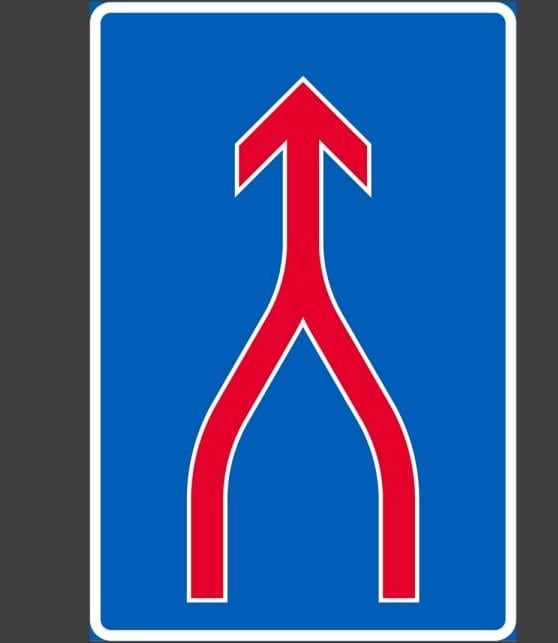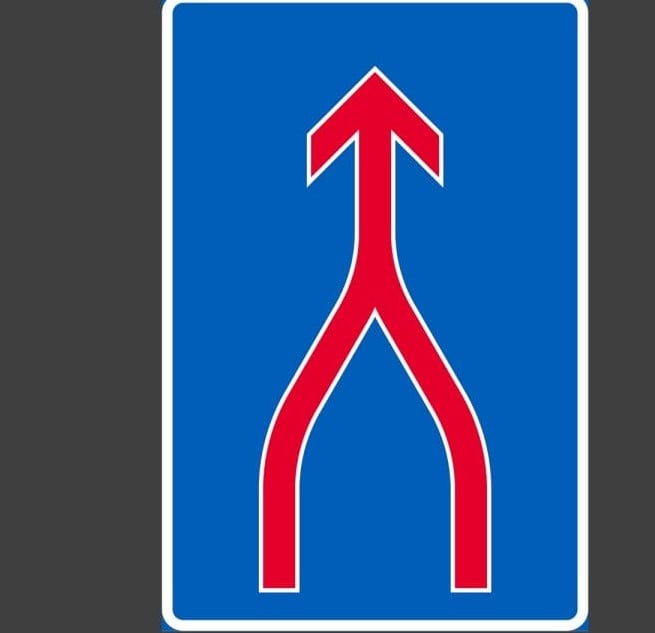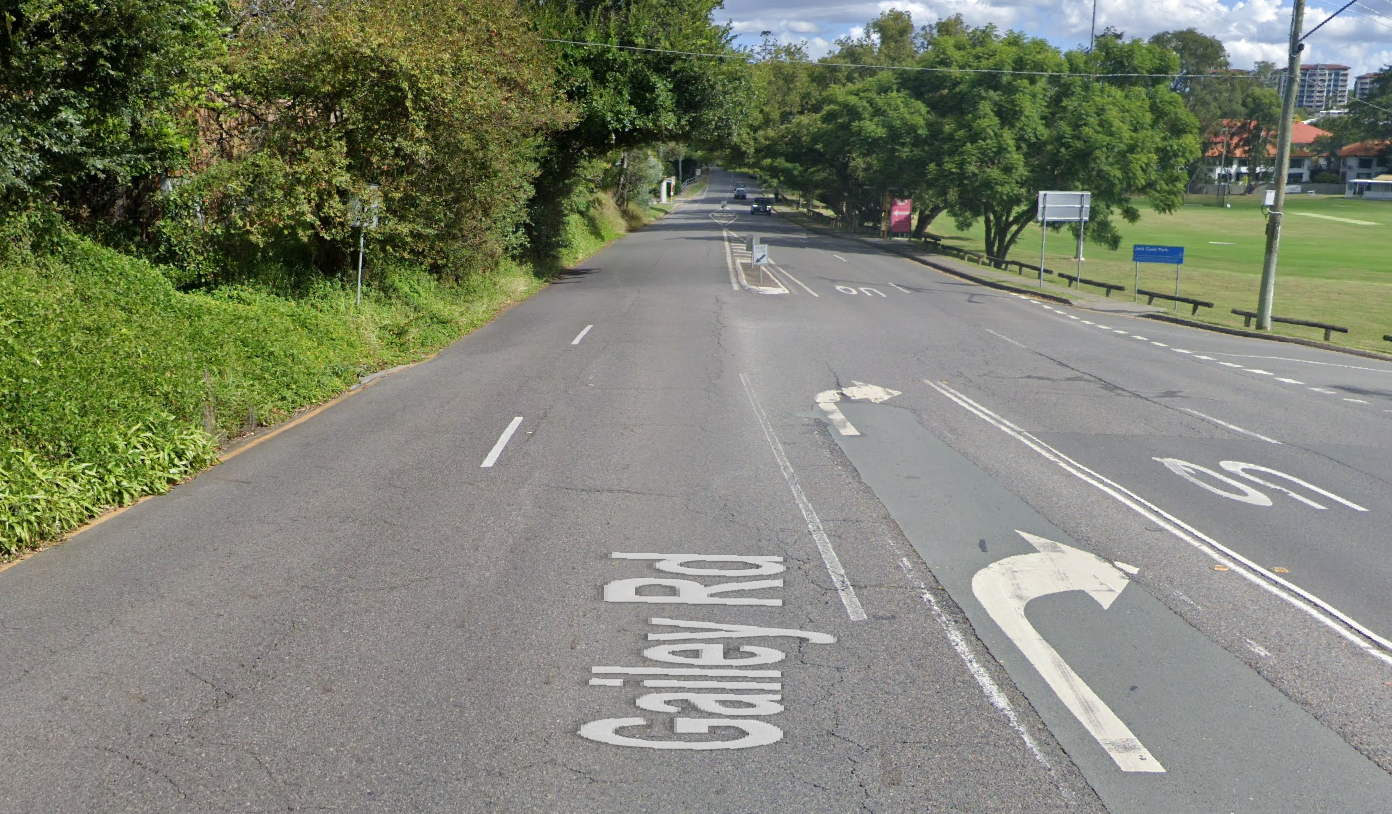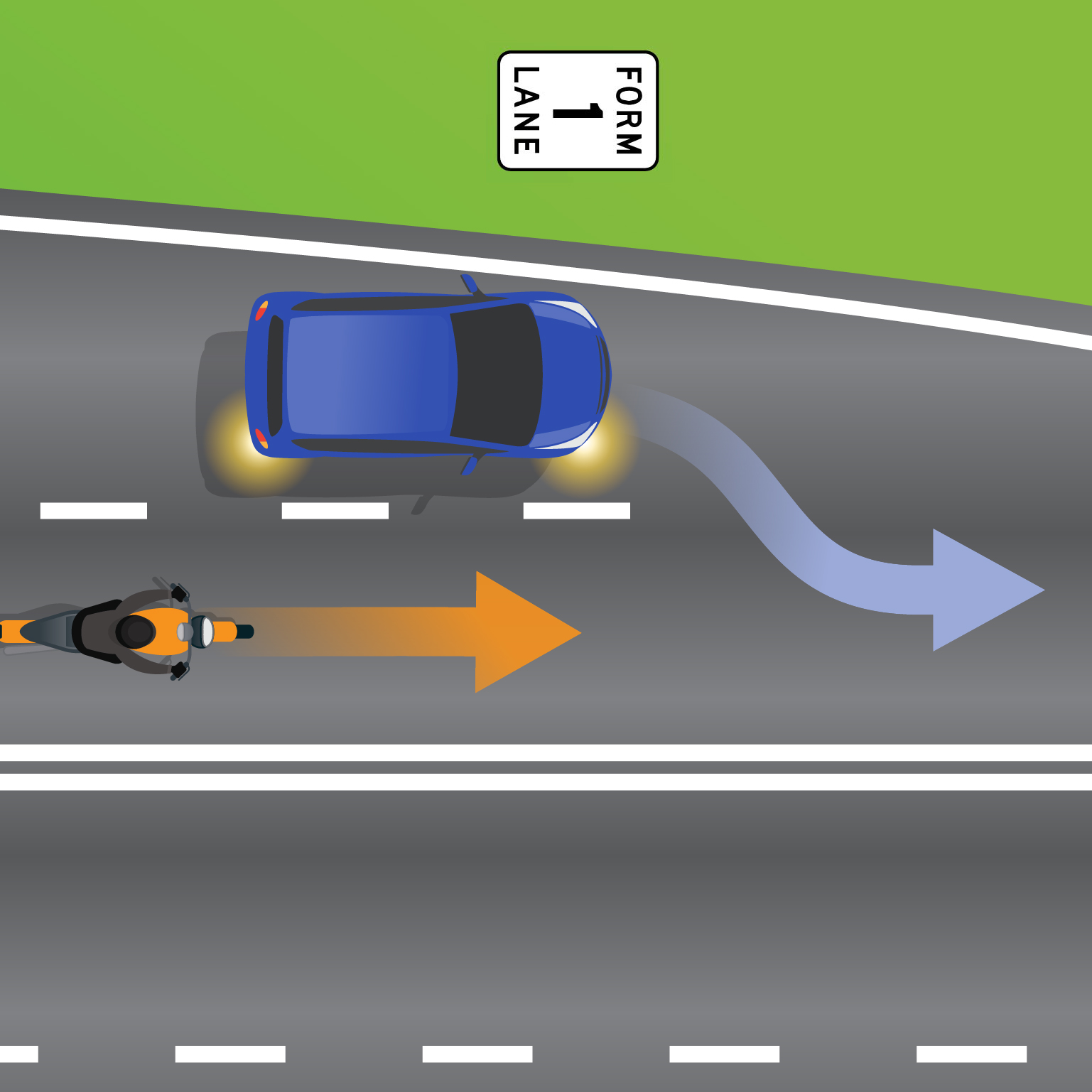Why would orange indicate? Blue is merging into orange's lane. Orange is going straight. Blue indicates.
Brisbane
Home of the bin chicken. Visit our friends:
I think there are two types of merges, this one is 2 into 1, not left lane ending
Transport Operations (Road Use Management—Road Rules) Regulation 2009 QLD
Section 149
Giving way when lines of traffic merge into a single line of traffic
A driver in a line of traffic that is merging with 1 or more lines of traffic travelling in the same direction as the driver must give way to a vehicle in another line of traffic if any part of the vehicle is ahead of the driver’s vehicle.
Maximum penalty—20 penalty units.
What's a penalty unit?
They say "penalty unit" so that each time they increase the fine amount, they only have to update the legislation in one place - the place where the value of a penalty unit is defined. Otherwise, every time the fine amount changes, they would have to recalculate all the penalties and update the legislation in hundreds of places with a new dollar amount.
Yup, that part is easy enough. The part in doubt is who has to indicate in this scenario. I contend section 45(2) and (3) both apply, so both drivers must indicate (blue indicate right, orange indicate left). Others have made cases for only blue, or for neither.
@Zagorath
Only blue indicates, because they are the only one making a physical lateral movement with respect to their lane. The bike keeps straight with respect to their lane so no need to indicate.
What would the bike even indicate?
Left, because they are merging with the line of traffic to their left.
I think you're imagining these sort of "two merge into one but you have to guess which" lanes. I'm not sure but i think you might.
The image clearly shows the blue lane merging into the orange, not them "merging equally."

But on that note we do have a sign showing that people need to join "like a zipper" as it were, taking turns.
So it'd depend on which lane last had a person merge.
But this is in Finland. Dk bout straya

In Spain you are supposed to indicate even when changing lanes in any road, for each lane you cross. So obviously what is shown is correct.
In Australia you also indicate when changing lanes. The catch is that in this scenario, you aren't really changing lanes in that way. See where the dashed line ends? After that point there is only one lane in the direction of travel. It makes it a little less clear.
In spain you ARE changing laneain this scenario. Legally speaking lanes are not merging, the left lane is ending and the right lane continues. The left lane is merging into the right lane, so it's a literal lane change. Regardless of where the dashes end that's how it works.
What about in the scenario shown in this real-world picture?

Or do you not have scenarios like that?
Here we make a distinction between one lane ending and two lanes merging. This government advisory webpage gives examples of both. In theory they could look like the above, but my experience is that in practice, when it's "two lanes merging" it tends to be shaped more equally between the lanes, like in the real-life image shown there.
~~What about the arrow indicates anything but the left lane of the right road merging INTO the centre lane of the right road? Its a literal lane change. I feel like you couldn't have picked an easier real life example.~~
~~Edit: wait, that's an Australian image! Sorry for the confusion. That's not a lane merge but the right lane getting out of the road for an intersection that is not shown in the picture, right? The road also lets you incorporate again into the left side lane. It would have been obvious if I were to be driving there though. In fact, it looks like it's one of those turns where you stop the car so it's clearly an incorporation and you need to indicate.~~
~~Maybe you got confused by the "it's clearly the left one" thing? I meant that in the image shown, it's the left one who has to indicate because it's the car that is incorporating into the other lane.~~
Edit2: I'm fucking blind. You are right, that's a lane merge on the left side of the image and unless there are indications before they merge I would assume that the main lane (right side for almost all the world besides UK and Australia I guess, sorry again for the confusion) is the one that stays and the auxiliary lane is the one that's to merge, so I would assume that the right lane indicates in your image. I agree that without prior indications it might get confusing.
Third fucking edit because I didn't bother reading you link until now. Those are indications on who has to give way, not on who has to indicate (turn on the lights, which is what this post is about). Both of the examples have the lane that ends indicating the lane change with lights regardless of them having the right to go or giving way to the other car.
I have an example that is ~~way more confusing~~ right next to where I live, but we are taught on this literal curve when getting the license so there's no doubting about it. For context, there are tons of arrows asking the left lane to change into the right for about 1KM before you reach this point so it's confusing only if you ignore all indicators and only see the image I posted, ~~but still, more confusing than your example for sure.~~

I have 3 of these near me and I can tell you nobody indicates. Who has right of way? The dickhead who is speeding to get ahead first.
Edit: whoops this is Brisbane question. My apologies.
Who has right of way? The dickhead who is speeding to get ahead first.
whoops this is Brisbane question. My apologies.
Still a pretty relevant response given some driver in Brissy unfortunately. Most of them are pretty solid here though to be honest. It’s refreshing. Some days during the commute most drivers are straight up reasonable. Coming from NSW, shits weird.
I'm not from the land of Oz but everything I can see online from official state sources does not specifically say, but all their demo videos have the person in the left lane indicate and the one in the right lane doesn't. E.g. the one around merging on this page or the images and video on this page.
I couldn't find anything with it written down, but it seems to be implied that in a merging scenario it's the left lane ending and they need to indicate into the right lane which continues as the only lane.
This is in contrast to NZ where everything I can find says both vehicles indicate.
How would the bike indicate in this scenario? With a left indication while not changing direction or lane? I would interpret that as them wanting to leave the road on the left side after the merge and indicating it impatiently.
In the example videos, the vehicle in the bike's position did not indicate. It's not explicitly covered but it seems like the expectation is that only the vehicle in the left lane indicates (i.e. only the car, not the motorbike).
That's for Australia. In NZ it seems the expectation is that both vehicles indicate (this is how I do it, but I'm in NZ so that makes sense).
Neither country seems to explicitly say it's required in official information.
I never understood why the indication, left lane is still the left lane and conversely so is the right lane still the right lane. Back last millenia when I got my license, the instructor said I don't need to indicate so I just continued their teachings. When there are 3 or more dropping down, then I understand as there's usually a bus lane or turn that is near also.
The instructor said I don't need to indicate
This explains so much. These days the manual says you must indicate pretty much for every turn (and lane change) short the road curving. Which I agree with, the amount of people changing lanes or turning without indicating and nearly causing an accident shits me. Same with people who indicate last second for 1/50th of a second. As the old man says “they’re called indicators not commentators” they meant to give an indication of what you’re about to do.
Tangentially before moving to Brisbane I lived in a small rural “city” full of roundabouts. You could speculate the age of a driver pretty accurately by whether they indicated coming off a roundabout or not.
a small rural “city” full of roundabouts
Ah, a Canberran.
Hahaha even I’ve heard this about Canberra. Nah northern NSW, I promise you haven’t heard of it.
Damn, small enough that you're confident I won't have heard of it, but large enough that it's officially a city? That leaves me very intrigued. Does it show up at the 7z zoom level on Google Maps? (Which on my 1080p desktop monitor is the most I can be zoomed in while seeing all of NSW' width.)
It’s kinda of the meme amongst locals. Armidale. Apparently it’s a city because it has a cathedral, so it totally counts guys! Lmao. Though I heard this as a teen, a quick google apparently says this was a thing in the uk way back in the day. No idea why it counts as a city.
Oh, I've been to Armidale! Just for one night many years ago as a stop off on a leisurely scenic drive back from Newcastle to Brisbane. Apparently the pollution is terrible in winter because it's just a bowl.
My other Armidale fun fact is that, according to an Australian corvid expert on Reddit many years ago, the general rule of thumb is that Armidale is the dividing line between Australian crows and ravens. South of Armidale most large black birds you see will be ravens. North of it they're crows.
But if we're doing cities that have no business being cities: Charters Towers, an hour or so inland of Townsville in FNQ. Apparently it got big enough back during the gold rush to be determined a city.
Wow small world! When I first moved here I met someone who also went to UNE (the university in Armidale). Like they can’t be that low but still, what’re the odds? Why do I feel like I recall or have history with charters? Maybe a mate.
My other Armidale fun fact is that, according to an Australian corvid expert on Reddit many years ago, the general rule of thumb is that Armidale is the dividing line between Australian crows and ravens. South of Armidale most large black birds you see will be ravens. North of it they're crows
That is actually neat as hell and I’m definitely going to be citing that to mates in the future. However I will internally be thinking of it as “Armidale is the city of crow turf wars” as it’s pretty on brand lmao.
Oh yeah it can get pretty bad in winter, we definitely didn’t refer to it as a hole because of it. No sir. When we first moved there, when the temperature was very much earning its namesake of New England and as a result the smog was bad. Fuck it was amazing when we first got there though. Rained all the time, very occasionally snowed and always green. However unfortunately we brought the drought from central (ish) QLD down with us not long afterwards. Sorry Armidale, our bad.
I meant at lane merges but I agree your point that as we get older we don't tend to indicate as often as we should. The rule I was taught about indicating was 3 'clicks' of the indicator before moving across lanes. Most people turn the indicator on as they are changing lanes and it can be dangerous as fick on the old M80 in Melbourne.
Ohhh my bad.
Most people turn the indicator on as they are changing lanes and it can be dangerous as fick on the old M80 in Melbourne.
These people wouldn’t happen to drive BMWs would they? Nah memes aside it’s not just the Beamer drivers sadly.
My top shit driver models are:
- BMW 5 Series
- Toyota Camry
- Nissan Maxima
- Hilux Rogue
I have left the ranger off since I drive one of them for work 🙃
That seems like a pretty stupid road design. Where I live one lane always has the dashed line go to the edge of the road to indicate which lane is ending and which lane is continuous, where the vehicle in the lane that's ending is the one to require indicators. There's never two lanes that just combine into one with no way to tell who has the right of way.
There is a way to know, it’s called a zipper merge as defined in a link I posted elsewhere in this post. They are done to reduce congestion and I suspect at times, post hoc on roads where there isn’t enough space for a proper lane end/merge.
Not Australian but if that bike is the faster vehicle, they gonna find out
The arguments as I understand them:
Blue is deviating from their line, orange is continuing straight, therefore only blue indicates.
Blue is merging to the right, orange is merging to the left, therefore both must indicate towards the side they are merging to.
Neither blue nor orange are changing lanes, they are simply entering the lane that their lane becomes. Therefore neither indicates.
Blue is “changing lane”, if they continued straight they’d go off the road. At least in the NSW drivers manual this is specified as a zipper merge. I treat them the same in Brisbane.
Blues lane is ending, of the two only one has to alter their steering wheel (or in the bikes case, leading wheel) to stay on the road. The orange vehicle is simply driving straight. The centreline of the road is indicative of this.
When you’re driving on a road and the number of lanes or lines of traffic reduces, and there are no longer any road markings, you must give way to the vehicle that’s ahead of you. This is called a zipper merge.
Sauce
That's a user-friendly advisory article. I'm asking what's specifically in the legislation. It also doesn't actually say anything about indicating, only implies it in the graphics. No text or speech ever discusses indication.
Blues lane is ending
No, two lanes are merging. That's why this is different to a situation where one lane ends, in which case the continuing lane always has right of way.
It is also supplemental to the drivers manual, which the test to get your license is based on. Get enough of these wrong and you fail, no license.
No, two lanes are merging
Sorry, but that’s incorrect, the lanes are being reduced (edit: which to be fair, and likely the source of confusion, is all but synonymous with two lanes “merging”). Merging describe what traffic must do as a result of this reduction. The reduction is simply not marked, to indicate a zipper merge. Otherwise you’d be crossing a broken line and have to give way to traffic already in the lane you’re merging into. Being it is unmarked it means a zipper merge, which means traffic in the lane you’re merging with has to give way to you.
When the lane you’re driving in is ending and you need to cross a broken line to move into another lane, you must give way to vehicles already in that lane – for example, when you’re joining a motorway
You must indicate to let others know when you plan to move into another lane. Make sure your indicator is off after you’ve merged or changed lanes.
Definitely not an edit and was here the whole time 2: Blue goes from being beside the broken line to (after merging) being beside the double dividing line. Whereas before and after the merge orange remains beside the double dividing line. If I had 6 hours spare I could go on paint and continue the broken line, turning the unmarked ending of the lane into a marked one demonstrating this.

@CTDummy @Zagorath 'scuse my butting in from over Masto way.
Going by Qld Road Rules:
From what you've quoted CTDummy, neither would need to "cross a broken line" - the line marking just ends. The car "should" indicate, and as the "in front" vehicle, gets to go first. The motorbike does not need to indicate.
If the left lane had markings that went all the way into a lane-ending merge, the car gives way to the bike.
The link below does not talk about indicating, and I don't indicate if I am in the left lane in this scenario.
https://www.qld.gov.au/transport/safety/rules/road/lanes
No worries, the more in the fediverse the merrier.
From what you've quoted CTDummy, neither would need to "cross a broken line" - the line marking just ends.
Yes, that lines up with my comment. I’m providing alternatives as examples. The rest of your comment is pretty much what I’ve said in mine.
Here's what I think is the relevant legislation.

My interpretation is that both are "entering a line of traffic" to the right or left, so both should indicate. But I'm far from confident.
Which clause there would compel the bike to indicate?
2 d) / 3 d) are "entering a marked lane, or line of traffic, to the left/right" but this line is directly ahead of the bike.
Seems fairly straightforward. The car is ahead of the motorcycle, so the bike should give way. Of course, he won't, and he's in the car's blind spot, so he'll get angry and break the car's passenger side mirror in passing. The car driver having no clue, will get angry in turn, and swerve into the biker, and they'll both crash. The car behind them will catch the whole thing on dashcam and post it on Facebook, asking, "who's at fault here?"
People will blame the guy on the bicycle.
This is where you go back to rules 1 and 2 if driving;
- Don’t try to occupy the same space as someone else.
- Don’t be a dick. (Sorry; correct rule 2 is to assume that everyone behind the wheel of a car is an idiot (including yourself)).
Here's a relevant TMR section on the website to do with merging in these situations. Noticeably (and it's more apparent in the video), they only ever show the car in the left lane indicating.
https://www.qld.gov.au/transport/safety/rules/road/lanes
What they show in pictures is not what's written in the law. It wouldn't be the first time TMR's interpretation in supplemental material misunderstood the law.
